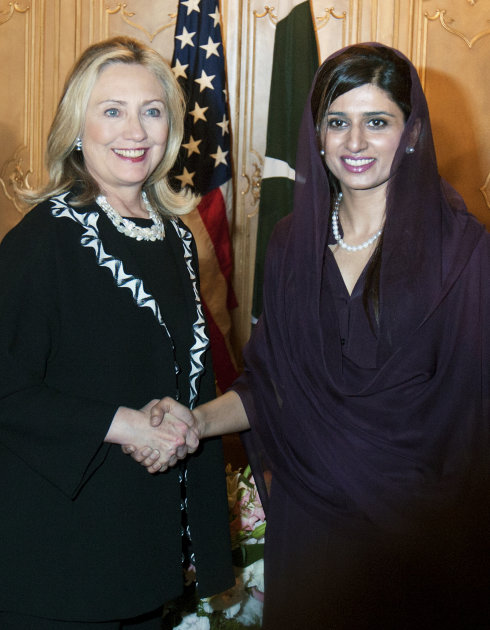M WAQAR..... "A man's ethical behavior should be based effectually on sympathy, education, and social ties; no religious basis is necessary.Man would indeed be in a poor way if he had to be restrained by fear of punishment and hope of reward after death." --Albert Einstein !!! NEWS,ARTICLES,EDITORIALS,MUSIC... Ze chi pe mayeen yum da agha pukhtunistan de.....(Liberal,Progressive,Secular World.)''Secularism is not against religion; it is the message of humanity.'' تل ده وی پثتونستآن
Friday, October 21, 2011
US boosts pressure on Pakistan over terrorism
The Obama administration on Friday intensified pressure on Pakistan to do more to crack down on Islamist militants destabilizing Afghanistan, as U.S. Secretary of State Hillary Rodham Clinton delivered a tough public message that extremists have been able to operate in and from Pakistan for too long.
For the second time in two days, Clinton pressed Pakistani authorities to step up efforts against the Haqqani militant network, which is based in the country's rugged tribal region, and is blamed for attacks both inside Pakistan and neighboring Afghanistan.
After leading an unusually large and powerful U.S. delegation, including CIA director David Petraeus and Chairman of the Joint Chiefs of Staff Gen. Martin Dempsey, for four hours of talks with Pakistani officials late Thursday, Clinton met Friday with Pakistan's president and foreign minister to make the case.
"We should be able to agree that for too long extremists have been able to operate here in Pakistan and from Pakistani soil," she said. "No one who targets innocent civilians, whether they be Pakistanis, Afghans, Americans or anyone else should be tolerated or protected."
The U.S. has grown increasingly impatient with Pakistan's refusal to take military action against the Taliban-linked Haqqani network and its ambivalence, if not hostility, to supporting Afghan attempts to reconcile Taliban fighters into society.
Clinton made clear that that was no longer acceptable while American officials warned that if Pakistan continued to balk, the U.S. would act unilaterally to end the militant threat.
"Pakistan has a critical role to play in supporting Afghan reconciliation and ending the conflict," Clinton told reporters at a joint press conference with Pakistani Foreign Minister Hina Rabbani Khar. "We look to Pakistan to take strong steps to deny Afghan insurgents safe havens and to encourage the Taliban to enter negotiations in good faith."
The Haqqani group is considered the greatest threat to American troops in Afghanistan, and U.S. officials have accused Pakistan's military spy agency, the ISI, of providing it with support — an allegation denied by Islamabad. Clinton noted that U.S. and Afghan forces had recently launched a successful operation against Haqqani safe havens in Afghanistan and that Pakistan must do the same. On Thursday in the Afghan capital, she said those who allow such safe havens to remain would pay "a very big price."
After the lengthy meeting with Pakistan's prime minister and army and intelligence chiefs on Thursday and Friday's talks with Kahr, Clinton said the U.S. delegation had asked "very specifically for greater cooperation from the Pakistan side to squeeze the Haqqani network and other terrorists because we know that trying to eliminate terrorists and safe havens from one side of the border is not going to work."
"It's like that old story: you can't keep snakes in your backyard and expect them only to bite your neighbors," she said.
Clinton made the same argument later in a town hall meeting with civic leaders.
"No policy that draws distinctions between good terrorists and bad terrorists can provide long-term security," she said.
She also acknowledged that U.S.-Pakistani ties were now badly strained. "Our relationship of late has not been an easy one," she said. "We have seen common interests give way to mutual suspicion."
For her part, Kahr repeated Pakistani denials of any government connection to the Haqqanis.
"There is no question of any support by any Pakistani institution to safe havens in Pakistan," she said.
And, she insisted that Pakistan and the U.S. shared the same goal.
"Pakistan takes the threat of terrorism seriously," she said, noting that thousands of Pakistanis had been killed by extremists over the past decade. "We are committed to this process, we would be willing to do whatever we can to be able to make this a success."
What is needed now, she said, is to try to agree on how to "operationalize" efforts to end the threat.
Clinton said the urgency of the situation required that that the operationalization take place "over the next days and weeks, not months and years."
Earlier this week, Pakistan's powerful army chief Gen. Ashfaq Kayani said in a rare briefing to two parliamentary defense committees that the country has been getting mixed signals from the United States, with the Pentagon urging the military to focus on fighting militants and the State Department requesting help in negotiating with the insurgents, said a parliament member who attended the meeting.
Kayani said Washington needs to make up its mind because it won't work to attack them and try to negotiate with them at the same time, according to the lawmaker.
The large U.S. contingent was meant to display unity among the various U.S. agencies with an interest in Pakistan, including the CIA, Pentagon and State Department. Clinton arrived in Islamabad after saying In Kabul that she and the team would "push Pakistan very hard."
The Pakistani military has said it can't launch an offensive against the Haqqani network in its safe haven in the North Waziristan tribal area because its troops are stretched too thin by other operations against insurgents at war with the state.
But many analysts suspect the military is reluctant to target a group that is seen as an important potential ally in Afghanistan once foreign troops withdraw. Both the U.S. and Pakistani governments had close relations with the founder of the Haqqani network, Jalaluddin Haqqani, during the war against the Soviets in Afghanistan in the 1980s.
Subscribe to:
Post Comments (Atom)

No comments:
Post a Comment